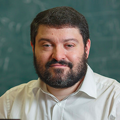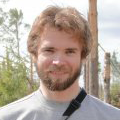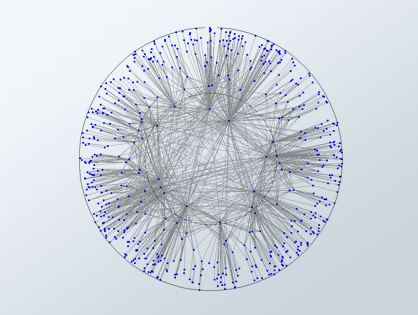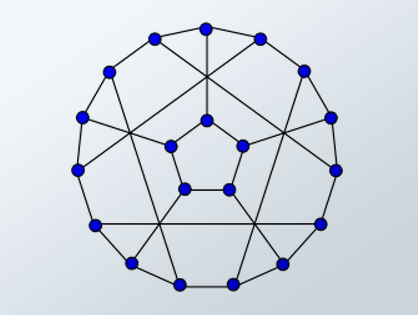Loading...
Program Overview
The Phystech School of Applied Mathematics and Informatics of the Moscow Institute of Physics and Technology (MIPT) launches a call for the two-year Online Master’s Program «Contemporary combinatorics and Applications» (in English). The Program will create a solid foundation of knowledge of modern discrete mathematics and its applications in computer science and in the analysis of complex networks.
This program is focused on the modern aspects of combinatorics (discrete mathematics) and its applications in computer science and in the theory of complex networks. Students both study advanced state-of-the-art methods used in discrete mathematics and foster intuition of working with discrete objects and models and do research in various topics of discrete mathematics – either pure or applied.

We invite you
János Pach is a mathematician and computer scientist working in the fields of combinatorics and discrete and computational geometry. Pach received his Candidate degree from the Hungarian Academy of Sciences, in 1983, where his advisor was Miklós Simonovits. Since 1977, he has been affiliated with the Alfréd Rényi Institute of Mathematics of the Hungarian Academy of Sciences. He was Research Professor at the Courant Institute of Mathematical Sciences at NYU (since 1986), Distinguished Professor of Computer Science at City College, CUNY (1992-2011), and Neilson Professor at Smith College (2008-2009). In 2008, he joined École Polytechnique Fédérale de Lausanne as Professor of Mathematics.
Gyula O.H. Katona is a Hungarian mathematician known for his work in combinatorial set theory, and especially for the Kruskal–Katona theorem and his beautiful and elegant proof of the Erdős–Ko–Rado theorem in which he discovered a new method, now called Katona's cycle method. Since then, this method has become a powerful tool in proving many interesting results in extremal set theory. He is affiliated with the Alfréd Rényi Institute of Mathematics of the Hungarian Academy of Sciences.
Watch video invitation from Gyula O.H. Katona
"MIPT is one of the strongest universities in Europe. Especially in Graph Theory, Combinatorics and their Applications.
This is why I did not hesitate a minute when I was asked in 2015 to join the new Master’s program. I accepted this offer with great pleasure. Since then I give each year a series of lectures on my favorite area: Extremal Set Theory. So, you do not know what it is? I give an example.
There are n people, members of a society. For different tasks they form committees. The democratic rule is that no committee can be a proper subset of another one. At most how many committees can be formed? If you chose this program, I will tell the answer in the first class. Extremal Set Theory has many other similar, but not so easy problems. But Combinatorics has many other, nice, interesting subfields. You can learn all of those from my excellent colleagues.
What is nice about Combinatorics? On the one hand it asks questions that can be explained to a highschool student between two bus-stops, though to answer the question might be very difficult, needing surprising ideas. On the other hand Combinatorics is in "one step" from real life problems, it is really an applicable mathematics, I always enjoyed teaching these classes, since the audience consisted of smart, motivated young people from all around the world. And I had the impression that they liked that I taught them. In one case it was sure. A Chinese lady, after receiving her Master’s degree at MIPT, came to Budapest to continue her studies and she is now writing her PhD thesis under my supervision.
One more thing. From MIPT, within 30 minutes you can reach the center of an exciting, vibrant city: MOSCOW."
Nelly Litvak is professor in Algorithms for Complex Networks and has a background in Applied Probability and Stochastic Operations Research. She works on mathematical methods and algorithms for complex networks, such as social networks and the WWW. Real-life networks are modeled as random graphs, and algorithms are used to extract information from the massive network data.
The overall goal of her research is to extract value from (Big) Data, focusing on network data. Her research revolves around three main topics: Information extraction and predictions based on data, mathematical analysis of network characteristics and randomized algorithms. The first looks at defining and collecting the correct measurements and data for specific purposes and deducing networks from data. The second examines mathematical properties of algorithms in networks, for example, the famous PageRank that Google invented to rank web pages. The third looks at efficient algorithms for computing network characteristics when the complete network data is not available.
Features of the implementation of the Master’s program
With the help of new educational technologies and the “flipped learning” approach, courses on basic specialties, compulsory general education courses and interaction with a research supervisor on writing research are being transferred to the online form.
The educational program consists of:
- 1. electronic courses in which the student will be able to vary the pace of study;
- 2. weekly webinars in the format of “office hours”, in which you can interact interactively with the teacher and ask the questions;
- 3. personal advice on the conduct of scientific work.
Intermediate exams are taken using remote identity verification technologies with a remote proctor controller.
Career benefits for the graduates
Top 5 skills
The students who enter the program are expected to develop/strengthen the following skills:
- — The ability to read original research papers on various topics of combinatorial mathematics.
- — The ability to carry out a supervised research in the area of choice in combinatorics.
- — The ability to design mathematical models for a real world problems.
- — The ability to present the results of the research to professional community.
- — The ability to carry out computational experiments backed by theoretical considerations.
Career tracks
- — Researcher (mathematics, applied mathematics, computer science).
- — Software developer / algorithm designer.
- — Analyst.
Spheres for future employment
- — Research institutions in mathematics in computer science.
- — Information technology companies, incl. the Program Partners.
Professors

He is a principal research fellow and the head of the Laboratory of Advanced Combinatorics and Network Applications. He also heads the joint MIPT–Sberbank R&D laboratory, and the Chair of Discrete Mathematics. He coordinates the joint research programs of Yandex and MIPT and serves as the editor-in-chief of the Moscow Journal of Combinatorics and Number Theory.
Prof. Raigorodskii was awarded the Russian President Science and Innovation Prize in 2011, and a Federal Professor title in 2015.
Apart from MIPT, Prof. Raigorodskii has part-time positions at the chair of mathematical statistics of the faculty of Mechanics and Mathematics at the Lomonosov Moscow State University. Prof. Raigorodskii gives lectures on combinatorics on the faculty of Bioinformatics and Bioengineering of the Moscow state university, at Yandex Data Analysis School and joint Bachelors program of Higher School of Economics and New Economic School.
Prof., Dr. Sci. A.M. Raigorodskii is the head of Phystech School of Applied Mathematics and Informatics

Gyula O. H. Katona is a Hungarian mathematician known for his work in combinatorial set theory, and especially for the Kruskal–Katona theorem and his beautiful and elegant proof of the Erdős–Ko–Rado theorem in which he discovered a new method, now called Katona's cycle method. He is affiliated with the Alfréd Rényi Institute of Mathematics of the Hungarian Academy of Sciences.
Katona was secretary-general of the János Bolyai Mathematical Society from 1990 to 1996. In 1966 and 1968 he won the Grünwald Prize, awarded by the Bolyai Society to outstanding young mathematicians, he was awarded the Alfréd Rényi Prize of the Hungarian Academy of Sciences in 1975, and the same academy awarded him the Prize of the Academy in 1989. In 2011 the Alfréd Rényi Institute, the János Bolyai Society and the Hungarian Academy of Sciences organized a conference in honor of Katona's 70th birthday.
Gyula O. H. Katona PhD, Professor

Associate professor at Moscow Institute of Physics and Technology, fascinated by discrete mathematics and interested in its applications.
Alex Dainiak

Pach received his Candidate degree from the Hungarian Academy of Sciences, in 1983, where his advisor was Miklós Simonovits.
Since 1977, he has been affiliated with the Alfréd Rényi Institute of Mathematics of the Hungarian Academy of Sciences. A
He was Research Professor at the Courant Institute of Mathematical Sciences at NYU[5] (since 1986), Distinguished Professor of Computer Science at City College, CUNY (1992-2011), and Neilson Professor at Smith College (2008-2009).
In 2008, he joined École Polytechnique Fédérale de Lausanne as Professor of Mathematics.
He was the program chair for the International Symposium on Graph Drawing in 2004 and Symposium on Computational Geometry in 2015. He was an invited speaker at the Combinatorics session of the International Congress of Mathematicians, in Seoul, 2014
János Pach Ph.D., professor and mathematician

Researcher in the company Yandex. Author of online courses on the largest educational platforms Coursera and the National Open Education Platform (Russia)
Maksim E. Zhukovskii, Ph.D., Associate Professor
Our students can choose courses from any track and create their own educational profile. This program provides an opportunity to get solid background in fundamental mathematics and highly practical skills in operational research and data science. This broad diversity in educational program allow you to choose your future work trajectory freely.
The Program will create a solid foundation in modern discrete mathematics
and its applications in data science and operation research.
The program offer three tracks:
(academic) Advanced combinatorics
The program was founded in 2015. It is focused on modern aspects of combinatorics (or, a bit more generally, discrete mathematics) and its applications in computer science and in the theory of complex networks.
The program starts with a bunch of courses that we call “re-indroductional”. These are needed to equate students’ basic knowledge in algebra, probability and basic discrete mathematics. We will rely on that basic tools during the next three semesters to build a solid picture of modern combinatorics, with a slight emphasis on graph (and network) theory and geometry. Every semester we will also have at least one course by an invited lecturer.
Where to work after graduation:
- - Academy (Discrete mathematics, Computer Science, Complex networks, Bioinformatics and e.t.c.)
- - Telecommunications (Huawei, Cisco e.t.c.)
- - FAANG and their small brothers
- - Software development companies (Yandex, ABBYY, 1С e.t.c.)
- and others
Why choose this program:
- - Broad range of additional courses in advanced topics from world's leading scientists.
- - Additional courses in OR/DS can be chosen
Career opportunities
Mathematician (academic career):
One of the most respected profession! We propose one of the best academic track in combinatorics/discrete mathematics.
(applied) Operation Research
This track is designed for the students to concentrate in most applied areas of mathematics: optimization, probability and statistics, modeling and machine learning.
This track allow you to build successful career as research scientist in Finance (Risk / Revenue management), Supply Chain management, Logistics, Business Analytics, Operation management and other areas with non-trivial modeling problems. This track is also the best choice for students with background in Economics, Finance, Transportation, Marketing, Supply Chain management, Logistics who wish to upgrade technical skills and get in touch with most advanced modeling tools and concepts.
Where to work after graduation:
- - Academy
- - E-commerce (Amazon, Alibaba, Coupang, Ozon e.t.c.)
- - Banks and Hedge-funds (Tinkoff, Sberbank, J.P.Morgan Chase, Blackrock, Bridgewater, Two Sigma e.t.c.)
- - Transportation and Supply Chain (Uber, Nestle, PepsiCo e.t.c.)
- - Software development companies (Yandex, ABBYY, 1С e.t.c.)
- and others
Why choose this program:
- - MIPT is world-known university with one of the best MS and PhD programs in Operation Research (Optimization, Statistics, Discrete Math and Data Scinece)
- - Additional courses in pure math/DS can be chosen
Career opportunities
Operation Research Researcher:
Profession in the cornerstone of IT and Decision-making are in high demand in many industries: e-commerce and retail, transportation and logistics, telecommunications and finance.
(applied) Data Science
Data Science is one of the most popular research field in latest decade with broad range of applications. This program track dedicated novel research area: Data-driven operation research. It takes machine learning and deep learning, discrete mathematics, statistics, optimization and algorithms as main ingredients to forge new modeling and computational approaches for most complicated real-life problems.
Resent rise of Deep RL and RL for combinatorial problems is just one of examples.
This program allow you to study Data Science, Operation Research and how this two fields can be used together in real life.
Where to work after graduation:
- - Academy
- - Telecommunications (Huawei, Apple, Verizon e.t.c.)
- - Software development companies (Yandex, ABBYY, 1С e.t.c.)
- - E-commerce (Amazon, Alibaba, Coupang, Ozon e.t.c.)
- - Banks and Hedge-funds (Tinkoff, Sberbank, J.P.Morgan Chase, Blackrock, Bridgewater, Two Sigma e.t.c.)
- - Transportation and Supply Chain (Uber, Nestle, PepsiCo e.t.c.)
- and others
Why choose this program:
- - Fast but comprehensive dive in novel research field with huge potential and broad range of applications
- - MIPT is world-known university with one of the best MS and PhD programs in Operation Research and Data Science (Optimization, Statistics, Discrete Math and Data Science)
- - Additional courses in pure math can be chosen - make your understanding deeper
Career opportunities
Data Scientist/Data Analytics:
One of the hottest professions in IT industry with highest salary and huge demand: Amazon, Google and all other tech giants competing for skilled individuals in this area.
Program
How to apply
To apply for our program, please, fill-in the application form or write a letter to our email address interadmission@phystech.edu until mid-September. To your letter, you should attach your documents. The complete list of documents for applying:
•Copy of passport which will be used to enter Russian Federation. The passport should be valid for at least 18 month after the presumed date of starting the education program.
•Documents of your previous education (bachelor/specialist/master diploma) with the list of subjects studies and grades for them. If you haven’t received it yet – you can attach a certificate that you are still studying and will receive a diploma this year.
•Your CV including places where you have studied before or worked before.
•Letters of recommendation (at least two) are needed. Recommendation letters should be send by your referees directly to our email address interadmission@phystech.edu.
Applicants should have a basic knowledge of:
•Algebra: groups, rings, fields, finite fields, matrices, polynomials.
•Linear Algebra: vector spaces, bases, dimension, vector spaces over finite fields, examples.
•Basics of Combinatorics: rules of addition and multiplication, permutations, combinations with repetition and without, binomial coefficients and binomial theorem.
•Calculus: limits of consequences, continuous functions, limits of functions, derivatives, Taylor series.
•Probability: classical definition of event probability, geometrical probability model.
Beginning of the program - October 1, 2021.
Costof the program
The program welcomes any additional number of students selected by the committee.
The annual tuition fee is as low as 350 000 RUR.
Program partners
Our students have an opportunity to add an internship at Yandex research labs, Sberbank labs, 1C labs, Tinkoff labs, BioCad labs, ABBYY labs, Huawei labs, to their portfolio.






REVIEWS

At MIPT, and especially at the Phystech School of Applied Mathematics and Informatics, an extensive course of mathematics is taught. Most of the participants of the olympiads from MIPT significantly improved their results in the olympiad mathematics from the 1st to the 4th year, even without preparation of olympiads, but only at the expense of listened and informed courses. But lately, there have been many events at MFTI on Olympiad Mathematics — student math bouts, olympiad tournaments, trips to the Moscow State University, HSE and international VJIMC (www.vjimc.osu.cz), IMC (www.imc-math.org), NCUMC (www.mathdep.ifmo.ru/ncumc/).
Now I am preparing the MIPT team for international mathematics olympiads, participating in the compilation of many olympiads, teaching various mathematics to students and schoolchildren.
Mikhail Grigoriev

I chose the Phystech School of Applied Mathematics and Informatics because I wanted to get an education of the highest level. I knew it would be hard, but also I knew that at MIPT I would get knowledge that would help me a lot in my future life. MIPT is constantly developing and improving, it combines good basic training and courses on cutting-edge technologies. I was also interested in sports programming, and at MIPT there are very good conditions for participating in various championships and training.
Olga Kalinichenko

I chose this School because here you can do with discrete mathematics, applications of mathematics in IT and programming at the same time. At MIPT I got everything I expected, and even more: a lot of science, excellent teachers, an active student life and strong ties with interested employers.
I recommend the Phystech School of Applied Mathematics and Informatics to anyone who wants to apply mathematics and programming in real life.
Yuri Yarovikov

Undergraduate PSAMI is a well-thought-out and well-established program. It is based on a combination of strong mathematics and modern IT disciplines, and the top is formed due to the unique synthesis of academic science and technological expertise of companies. This allows to educate both promising scientists and highly skilled professionals in various fields: from infrastructure programming to banking. PSAMI graduates are highly in demand in the best IT companies, including Yandex.
Stanislav Fedotov

My name is Dmitri Shmelkin and I am leading Mathematical Modeling Competence Center at Moscow Research Center of Huawei. Huawei’s philosophy is to invest a lot in RnD and to encourage the scientists, even pure mathematicians, to co-work on innovation in Telecom and beyond in the form of scientific research. However, practical innovation requires good programming and Computer Science background. Young people graduate from the Applied Math and Informatics School are often suitable for the activity we need, because their well-known practical mindset is coupled by solid investment in fundamental Math and Physics expertise, especially important is their general self-start ability. We collaborate with the School on research project and also welcome young people to internship in our team even at Bachelor stage. Joining the School and then using the bridge to Huawei or other industrial sponsors is the shortest way to a well-paid challenging job aimed at Future.
Dmitri Shmelkin
Our School
School of Applied Mathematics and Computer Science of MIPT in a nutshell
1. Program included mathematics, physics and theoretical physics at the highest level possible in Soviet Union at that time.
2. World-renowned scientists were giving lectures, 8 of them later became Nobel Prize winners.
3. Not only lectures but also seminars were taught by professional researchers (at least of PhD level).
4. Starting from the third year of study students started participating in the cutting edge research at the best labs and research centers in Moscow.
1. MIPT has a nation-wide reputation and the best research labs, design engineering bureaus and businesses are competing to employ MIPT graduates. Specialists consider MIPT as one of the very best Russian Universities.
2. A significant part of the alumni take the scientific path and become fundamental researchers. Their education allow them to become the world leading scientists, like Nobel Prize Winners Andre Gaim and Konstantin Novoselov, the discoverers of graphene.
During the contest the ICPC team has interviewed Prof. Andrei Raigorodskii, the head of the MIPT School of Applied Mathematics and Informatics. The video interview is available on YouTube.

Other programs
ADVANCED COMBINATORICS
COMPUTER SCIENCE

Random graphs
In the course, we will consider certain models of random graph, but the main focus will be on the binomial model. We will study the main methods and tools of the random graphs theory and see how they are used to estimate distributions of the main graph characteristics (such as independence number and chromatic number).
We will also speak about the most known applicable models.

Advanced graph theory
During more than a century of active development graph theory went a long way from an offspring of topology and miscellanea of recreational-type questions to one of the mainstream disciplines within modern combinatorics, employing highly sophisticated techniques in the proofs and having many applications in other branches of mathematics.
This course of advanced graph theory illustrates some of the important advanced proof techniques in graph theory (algebraic and probabilistic methods), as well as introducing the learners to some research topics beyond standard introductory courses on graph theory.

Additive Combinatorics
Additive Combinatorics is a new explosively growing field of the modern combinatorics. Roughly speaking, additive combinatorics is an area studying any combinatorial questions regarding the group operation. This area of mathematics uses a variety of tools from different areas such as (in addition to Number Theory and Combinatorics) Dynamical Systems, Computer science, Probability Theory, Functional Analysis, Geometry and so on.
In our course we are planning to introduce some fundamental results of the area and describe some connections of Additive Combinatorics with Number Theory, Combinatorics, Ergodic Theory, Graph Theory, Fourier analysis, Geometry and other branches of mathematics.

Computability and complexity
This is an introductory course on theory of algorithms and computational complexity. The main goal of the course is to provide an intuition on what is an algorithmic problem, what is its intrinsic complexity and how the complexity of various problems may be characterized.

Introduction to Artificial Intelligence
This is an introductory course on Artificial Intelligence. We will present the basic AI concepts, such as knowledge representation models, state space search strategies, machine learning techniques, AI-planning methods etc. Programming skills are welcome, but not required. It’s up to the learner whether to do a programming project (either in Python or C++) or not.

 János Pach
János Pach
 Gyula O.H. Katona
Gyula O.H. Katona Nelly V. Litvak
Nelly V. Litvak